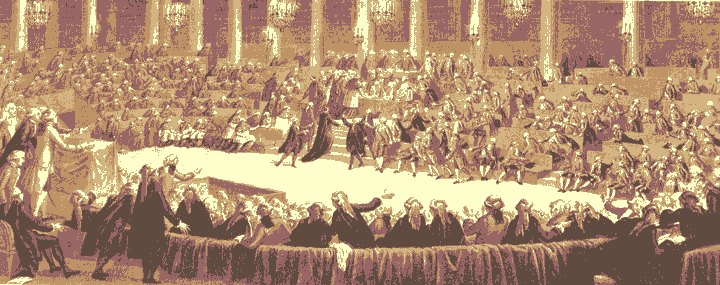Review: Chrystia Freeland. Plutocrats: The Rise of the New Global Super-Rich and the Fall of Everyone Else. October 2012.
[Paging Dr. Chomsky! Back in 2012 WOID was already on to the attempt to promote Chrystia Freeland as the Manufacturer-of-Consent in Chief for US-Canadian business interests. Imagine our pride and satisfaction when the same Chrystia Freeland turned up as the chief Canadian negotiator for CETA, the attempted EU-Canada trade deal. Imagine our Schadenfreude to watch selfsame Chrystia close to tears of incomprehension that a philosophy so gentil and patient as global capitalism should be given the heave-ho.]
As that great Marxist Warren Buffett used to say, a receding tide exposes the wrecks, and right now we’re witnessing the massive intellectual wreckage of the New York Times and the ideology it stands for. The wreckage was there all along, but times are tough and lying just isn’t what it used to be, now that any boor with a search engine can expose it for what it is.
Still, we can’t fault the Times for trying. On October 14 they published an essay adapted from a soon-to-be-published book, and I will assume the essay tells me what I need to know about the book in question: it’s written by the author who, as I charitably assume, is a moral notch above a presidential candidate in that the synopsis she gives in the Times actually matches the argument of her own book. Freeland's opening narrative is, that a city like Venice went into steep economic decline after 1350, when the Venetian elite “cut off commercial opportunities for new entrants…. [This] was the beginning of the end…for Venetian prosperity.” Therefore, goes her argument, we should beware a similar situation in our own day, when the "new" rich are selfishly depriving all the rest of us of opportunities to get rich as well.
I can appreciate the urgency behind the evidence, since the rich don’t seem too keen to give anything back any time soon; but I snorted bricks when I read the following:
This was the future predicted by Karl Marx, who wrote that capitalism contained the seeds of its own destruction.
Nope. Marx didn’t think the destruction of capitalism came about because the rich finally decided not to share after all those centuries of generosity and kindness. Marx knew damn well that boom-and-bust cycles were integral to capitalism, they were crises that by their periodical return put the existence of the entire bourgeois society on trial, each time more threateningly. And the seeds of the destruction of capital didn’t come, in the last instance, from the capitalists but from those whose livelihoods the capitalists can’t help destroying, including those failed entrepreneurs who sink gradually into the proletariat. Still, I have to admire those pseudo-scholars who, after claiming that Marx simplifies History by reducing it all to a single motivating dynamic, misquote Marx to support a thesis as linear and simple-minded as dental floss. The field of Economic History is known for its inanity, even among historians and economists; and there’s no more inane enterprise than the attempts of economic historians to explain the Middle Ages in terms of capitalist theories that weren’t even a gleam on the shield of a knight-errant. As the author of a standard textbook explained, the economic theories of the Late Middle Ages don’t make sense because the princes and nobles who followed them actually made out quite well when they weren’t supposed to do so according to real, scientific economic theory that wins a Nobel Prize today. So who you gonna believe, the economists, the author and the New York Times, or your lyin’ eyes that tell you, even today, of the continued economic, cultural and social achievements of the Venetian Republic? Can our economists explain how and why the selfish masters of the collapsing Venetian economy financed the building of La Salute, or the social centers known as scuole, or the palaces of the Veneto? And how does Freeland explain the rise of cultural entrepreneurs like Titian, Palladio, Nicolas Jenson, Aldus Manutius and Tiepolo? For a certain type of economic historian (and for Freeland, once an an editor at the Financial Times), all of this cultural, artistic splendor just goes to show how decadent Venice and Florence and Rome really were to begin with – it’s called the Lopez Thesis, by the way. There are a few, highly respected economic historians who do rely on the evidence; and they pretty much debunk the Lopez Thesis; but Freeland doesn’t even have the basic command of facts that would entitle her to take sides.
Here’s an example: as proof of the fact that the imputed collapse of the Venetian economy was due to the closing out of small entrepreneurs, Freeland points out that “By 1500, Venice’s population was smaller than it had been in 1330.” That’s the kind of statement that gets undergraduates flunked, unless they go forth to get published in the New York Times, which is to the Eastern Establishment Intellectual what a Gentleman’s C was to Dubya. Because there’s a basic, straightforward explanation for that population shift, as any History major knows: in 1347 the Black Death spread over Europe, wiping out a third of the population. Whatever entrepreneurs were left after that were far more likely to be hampered by the high cost of labor than by restrictive laws; and the laws themselves were more likely intended to keep the lower classes in check, not to impede the development of capital; but of course if you're coming at this problem from the fantasy that the social function of capital formation is not to control the lower classes but to help them become capitalists themselves, you'll project your fantasy, proleptically, into any historical narrative that comes along. Not-too-surprisingly, Freeland's book gets an endorsement from Joseph Stiglitz, the Great White Economist of the threatened petite bourgeoisie. What Stiglitz doesn't care to explain (and Freeland explains away with historicizing nonsense), is the dynamic relationship between income inequality which Freeland, Stiglitz and myself roundly denounce on one hand, and its relationship to the means of production on the other. Freeland is trying to solve a problem that has tormented the apologists of Free Enterprise since Burckhardt: that the rise of capitalism in the Early Modern Period was accompanied by greater, not lesser social inequality (especially in gender relations); by greater income inequality; by greater concentration of power; and by the greatest development of productive forces the world had ever seen. It's not the type of question that can be swept under the rug by by improvising equivalencies between economic wealth, productive power, and social relations. Even old-time Marxists have figured that out.
And it's a task that Freeland's not up to. The argument that the rich should give up their billions because otherwise society might go into decline is weak enough in itself, but if you can’t even buttress it with solid argumentation you’re in trouble. What’s truly frightening about all this, is that Freeland is a Harvard graduate and a Rhodes scholar. Then again, her screed is not against the 1% in general, it’s against those new-rich rich, the nasty new rich who, unlike the elites who own the Times and go to Harvard (the Sulzbergers and the Romneys and the Walter Lippmann Elites), don’t care to share.
Now suppose you were to argue that the rich should give up their money before they find their heads at the tip of a pike? The night of August 4, 1789, is the economic historian's version of the Fall of the Bastille. This was the night when the newly formed National Assembly was greeted with news that peasants throughout France were storming the manor, that the Great Uprising had come. Throughout the night, nobles and landowners went up to the Assembly podium to solemnly renounce their ancestral privileges—a nice gesture, no doubt, but in many cases mere frosting on the cake since the ancestral privileges were recorded in deeds and documents that at that very moment were going up in flames; and of course, no industrialists or entrepreneurs came up to the podium to voluntarily turn their factories over to their employees. This was the event to which a higher-up on the French Right referred recently when, commenting on the present fascination with redistribution of income, he spoke of "an unhealthy, August 4th atmosphere" among the power elites.

But, hey, what could go wrong, back in 1789? What could go wrong today? Everybody knew, back in 1789 (if they were up on the latest in economic theory) that landed property was the source of all wealth...
[10/15/2012; last revised 11/1/2012]
- PW
On point and on target and thank you as I was seduced by the one review I read.
Saved me the trouble.
I don't read very much that contributes to a richer understanding of the sea I am a fish in...
– Jim W., subscriber.
PW responds:
Thanks, that's why I felt I had to write this; it's why I put two short reviews up elsewhere, on Amazon and Goodreads. Of course the shocked troops of capital have gone ballistic in response:
Another absurd review that has little or nothing to do with the book, which is an excellent read BTW. Amazon is too generous with the chaff generators here...
– California Son.
PW comments:
“Chaff generators?” I wonder where that expression comes from… Oh, right:
Freedom to think and speak are not self-evident necessities... The right to utter words, whether or not they have meaning, and regardless of their truth, could not be a vital interest of a great state but for the presumption that they are the chaff which goes with the utterance of true and significant words.
But when the chaff of silliness, baseness, and deception is so voluminous that it submerges the kernels of truth, freedom of speech may produce such frivolity, or such mischief, that it cannot be preserved against the demand for a restoration of order and decency.
– Walter Lippmann, 1955.
